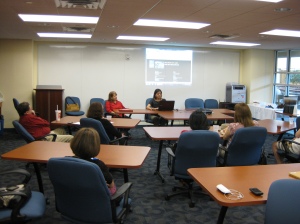VIA Faculty Focus: “Enough Time to Make a Difference in Students’ Lives”
Posted: May 9, 2012 Filed under: Uncategorized Leave a commentSince it’s nearly graduation time (and I’ll be hooding my first PhD!), I thought this piece by Maryellen Weimer at the Faculty Focus blog would be appropriate:
It’s that time of the year when students leave us. Some graduate and we celebrate their growth and intellectual accomplishments. We are sorry to see them go. Others cross the stage and their parting is no cause for sweet sorrow. Some leave without ever crossing the stage. And some temporarily leave, returning in the fall or for a summer session.
There are the teachers and students who barely notice one another, and then there are the interactions and relationships that stay with individuals for a lifetime, for better or worse. Those moments, and their enduring power, are what make teaching such a risky, and rewarding, endeavor.
DM
Thanks to all who attended our reception for CUT recipients, 5/4/12
Posted: May 6, 2012 Filed under: Aymara Boggiano, CTE-DTAT, David Mazella, Tamara Fish Leave a commentOn Friday, May 4th, the CTE’s Division of TA Resources (DTAR) held a reception to celebrate the awarding of certificates to 14 TAs who successfully completed our Certificate of University Teaching program in the spring. Hosting the celebration were the two people most directly responsible for this program, Aymara Boggiano and Dr. Tamara Fish, along with the CTE Director, Dave Mazella (DTAR’s Bruce Martin was unable to attend due to sickness). TA Supervisors Ruxandra Prodan (ECON) and Flavia Belpoliti (HSD) also attended.
The reception began with presentations of teaching portfolios by Lena Ogrokhina (ECON) and Maria Alvarez (HSD), where they each talked about the usefulness of compiling the portfolios. Both agreed that the portfolios were a huge help in reflecting upon, and learning from, their own teaching experience, and in preparing for a competitive job market.
After the presentations, Ms. Boggiano and Dr. Fish presented certificates to the candidates [click on thumbnail to enlarge]:
At the conclusion of our ceremony, Ms. Boggiano announced that this would be her final semester with the CTE and DTAR, and that she would be moving on to a new post at the University of North Texas. Drs. Mazella and Fish thanked Ms. Boggiano for her superb work establishing the DTAR and CUT programs, and wished her the best in the future.
Dr. Mazella also announced that Dr. Fish will take over supervision and coordination of the CUT program beginning this summer. The CTE is currently searching for a full-time replacement for Ms. Boggiano, which will carry the job title of Associate Director. Drs. Mazella and Fish will remain in contact with participating departments and supervisors until a replacement is found.
Our best wishes for all of you who have completed the CUT program. We hope everyone has a happy and productive summer.
David Mazella,
Director, UH CTE
Agnes DeFranco on the timing of core requirements
Posted: May 4, 2012 Filed under: Core Curriculum, David Mazella, THECB Leave a commentOK, Agnes asked if she could answer this at length. This is her response:
Q: The 42 credits of the core do not have to be taken in the first four semesters. Is that correct?
A: The purpose of the core, as stated by the Texas Higher Education Coordinating Board, is:
“Through the Texas Core Curriculum, students will gain a foundation of knowledge of human cultures and the physical and natural world, develop principles of personal and social responsibility for living in a diverse world, and advance intellectual and practical skills that are essential for all learning.”
So, if one thinks of the concept of “foundation of knowledge” and use courses such as English Composition I and II as an example, it makes a lot of sense for students to take these courses early so they will learn how to express their ideas and write better for all other classes that they will be taking subsequent to the composition classes.
Another example would be Math and Math reasoning courses. Math skills very quickly get rusty for most people when not practiced. Therefore, if students wait till their third or fourth year to take College Algebra, that may not be a wise decision as they might have forgotten a lot of the basics.
There are exceptions of course. For instance, some majors have many “levels” of classes, with one building upon another. For those students, they will need to start taking major courses in sequence to be able to graduate in a timely manner. Thus, one may see some students taking a core class later.
Therefore, while there is no requirement as to when students need to finish their core classes, we should promote and advise students to take these core classes in a manner that such classes will provide them with a “foundation of knowledge of human cultures and the physical and natural world, develop principles of personal and social responsibility for living in a diverse world, and advance intellectual and practical skills that are essential for all learning”.










